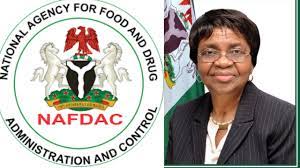National
NAFDAC And Indomie Noodles Scare: Sad Repeat of History?

BY EGUONO ODJEGBA
The National Agency for Food and Drug Administration and Control (NAFDAC) recently stirred the hornet’s nest with its alarm about unsafe Indomie Noodles, a popular food staple consumed by millions of Nigerians, especially children.
Sometime in 2003 or there about, Nigerians were subjected to the trauma of emotional and health inhibiting hoax by Dangote Pasta, who at the time was seeking a break into the noodles market where the producer of Indomie Noodles, Dufil Industry was already an established brand, controlling almost 97percent total consumers demand.
The shock of the alarm about poisonous indomie noodles on Nigerians was palpable, forcing the chief executive officer of Dufil to appear on Africa Independent Television (AIT) programme for a live demonstration, by cooking and eating packs of indomie noodles to reaffirm the safety of his company’s noodles.
The Dangote scare fizzled out as a hoax, and as one of those wicked and criminal pranks played by insecure competitors, worldwide. The matter was not only trashed in the dustbin under President Olusegun Obasanjo’s government, it has since become history; that troublesome academic subject our politicians have deftly removed from school curriculum.
Buf if Dangote Pasta acted based on its competitive instincts, which does not make it less criminal, the National Agency for Food and Drug Administration and Control (NAFDAC) is a regulatory body established to mind consumers’ safety and emotional welbeing.
Yet NAFDAC dared to toy with the emotions of millions of Nigerians with its ridiculous alarm as it obviously have become, over the safety of the popular staple food which is an everyday menu for Nigerians, with its now doubtful claim that the product’s ‘chicken brand’ was unsafe for consumption.
The agency warned consumers of the products and its various brands, especially children, to stop consuming them as one of its active ingredients has been found to aid the growth of cancer related ailments.
In fact, the agency proceeded to announce the immediate ban of the importation of foreign indomie noodles into the country; and followed that up by saying it is embarking on market surveillance to identify unsafe noodles and prevent Nigerians from consuming them.
That was serious official alarm that citizens cannot joke with, and which amounts to equally serious scare and apprehension. The alert was not intended to scare consumers of the products alone, but indeed also imposes quite some amount of moral guilt on the local producers of the products; aside the consequent loses that will be occasioned by consumers’ zero purchase out of fear.
According to the Director General of NAFDAC, Prof Mojisola Adeyeye, the discovery of ethylene oxide, an active ingredient in the said killer product, causes cancer. She hinged her warning on the heels of the reported recall of indomie noodles by Taiwan and Malaysian authorities, which were believed to have made the disturbing discovery.
And prompt, like robots programmed to accentuate alerts without personal verification, went to town, causing panic and confusion; since the same DG NAFDAC less than twenty fours recanted and said locally produced noodles are healthy and has no safety issues.
Her earlier statement reads in part: “Indomie noodles have been banned from being imported into the country for many years. It is one of the foods on the government prohibition list. It is not allowed in Nigeria, and therefore not registered by NAFDAC.
“What we are doing is an extra caution to ensure that the product is not smuggled in, and if so, our post-marketing surveillance would detect it.
“We also want to be sure that the spices used for the Indomie and other noodles in Nigeria are tested. That is what NAFDAC Food Safety and Applied Nutrition (FSAN) and Post Marketing Surveillance (PMS) are doing this week at the production facilities and in the market, respectively.”
Although she promised update Nigerians with the outcomes of the investigation, adding that the agency will from Tuesday, May 2nd, begin random sampling of Indomie noodles including the seasoning from the production facilities. Nonetheless the agency’s specific assurance, its inspection team couldn’t have even put on their safety overalls before the leadership recanted and reaffirmed the safety of locally produced noodles.
In a volter face, Prof. Adeyeye serving her second term in office denied reports banning Indomie instant noodles, and has assured consumers that the product is safe for consumption. The DG NAFDAC urged Nigerians not to fret over the South-Asia countries’ pre-emptive measures, noting that local producers are not affected by the discovery, noting “NAFDAC did not ban Indomie.”
“Indomie has been on the government prohibition list for many years to encourage local manufacturing. NAFDAC has registered several local manufacturers and the Indomie noodles have been safe.
“The Taiwan and Malaysia noodles have nothing to do with our local producers”, she said.
In justifying her earlier alarm, she explained that NAFDAC is in no way disregarding the reports from Asia but “is responding to the news as a cautionary post-marketing monitoring measure to ensure that locally-made noodles stay safe.”
If this is not a clear act of official negligence from the nation’s foremost safety regulatory body, one wonders what. NAFDAC has become a mere reactive agency, way down from its vibrant, responsive, knowledge based integrity and image, years back.
The confusion was so palpable that major producers of the staple food product have called for calm over the obvious ill timed warming.
However, the World Health Organisation (WHO,) has explained that ethylene oxide, which is an active ingredient in indomie noodles, is a colourless, highly reactive, end-flammable gas widely used as an intermediate in the production of various chemicals.
WHO, in a report, noted that findings from animal investigations, test systems, and epidemiological findings suggested an increase in the incidence of human cancer; adding that ethylene oxide should be considered as a probable human carcinogen and that its levels in the environment should be kept as low as possible.
Maybe in the days to come, NAFDAC may see the need to apologize to Nigerians for its unnecessary alarm, and or, its sudden volter face, which industry observers say may have probably been due to political pressure.


























